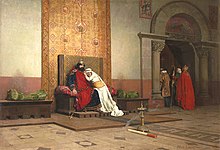Robert the Pious
| Robert II the Pious | |
|---|---|

The Excommunication of Robert the Pious
by Jean-Paul Laurens (1875) |
|
| King of the Franks | |
| Co-reign Solo-reign |
30 December 987 – 24 October 996; 24 October 996 – 20 July 1031 |
| Coronation | 30 December 987 |
| Predecessor | Hugh |
| Successor | Henry I |
| Born |
27 March 972 Orléans, France |
| Died | 20 July 1031 (aged 59) Melun, France |
| Burial | Saint Denis Basilica, Paris, France |
| Spouse |
Rozala of Italy Bertha of Burgundy Constance of Arles |
| Issue |
Hedwig, Countess of Nevers Hugh Magnus Henry I of France Adela, Countess of Flanders Robert I, Duke of Burgundy |
| House | House of Capet |
| Father | Hugh Capet |
| Mother | Adelaide of Aquitaine |
Robert II (27 March 972 – 20 July 1031), called the Pious (French: le Pieux) or the Wise (French: le Sage), was King of the Franks from 996 until his death. The second reigning member of the House of Capet, he was born in Orléans to Hugh Capet and Adelaide of Aquitaine.
Immediately after his own coronation, Robert's father Hugh began to push for the coronation of Robert. "The essential means by which the early Capetians were seen to have kept the throne in their family was through the association of the eldest surviving son in the royalty during the father's lifetime," Andrew W. Lewis has observed, in tracing the phenomenon in this line of kings who lacked dynastic legitimacy. Hugh's claimed reason was that he was planning an expedition against the Moorish armies harassing Borrel II of Barcelona, an invasion which never occurred, and that the stability of the country necessitated a co-king, should he die while on expedition.Ralph Glaber, however, attributes Hugh's request to his old age and inability to control the nobility. Modern scholarship has largely imputed to Hugh the motive of establishing a dynasty against the claims of electoral power on the part of the aristocracy, but this is not the typical view of contemporaries and even some modern scholars have been less sceptical of Hugh's "plan" to campaign in Spain. Robert was eventually crowned on 25 December 987. A measure of Hugh's success is that when Hugh died in 996, Robert continued to reign without any succession dispute, but during his long reign actual royal power dissipated into the hands of the great territorial magnates.
Robert had begun to take on active royal duties with his father in the early 990s. In 991, he helped his father prevent the French bishops from trekking to Mousson in the Kingdom of Germany for a synod called by Pope John XV, with whom Hugh was then in disagreement.
...
Wikipedia
